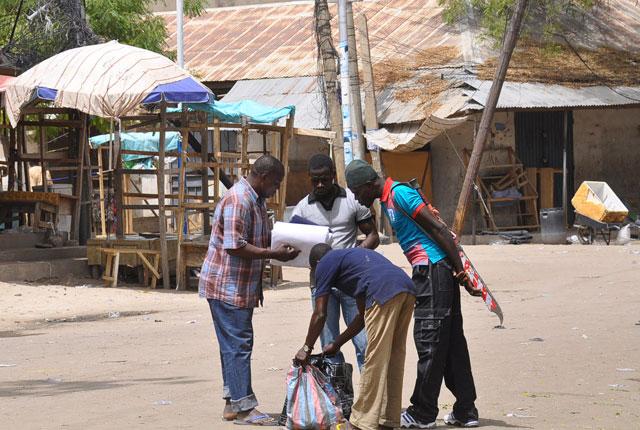You are here
Nigeria’s Jonathan vows ‘total war’ against Boko Haram
By AFP - May 29,2014 - Last updated at May 29,2014
ABUJA/KANO — Nigerian President Goodluck Jonathan Thursday vowed total war against terrorism as the country’s security forces stepped up efforts to rescue more than 200 schoolgirls kidnapped by Boko Haram Islamists 45 days ago.
“I am determined to protect our democracy, our national unity and our political stability by waging a total war against terrorism,” Jonathan said in an address marking 15 years since the return to civilian rule in Africa’s most populous country and largest economy.
“The unity and stability of our country, and the protection of lives and property are non-negotiable,” he said.
Nigeria returned to democracy on May 29, 1999 after nearly 16 years of military rule but the country has recently been blighted by a five-year Islamist insurgency in north and central Nigeria that has claimed thousands of lives.
The mass abduction of teenage girls on April 14 from a secondary school in Chibok in northeastern Borno state has sparked global outrage and drawn unprecedented attention to Boko Haram’s extremist uprising.
The incident has also drawn offers of military aid and intelligence from several foreign powers including the US, Britain, France and China.
“I have instructed our security forces to launch a full-scale operation to put an end to the impunity of terrorists on our soil,” Jonathan said.
“I have also authorised the security forces to use any means necessary under the law to ensure that this is done. I assure you that Nigeria will be safe again, and that these thugs will be driven away,” he vowed.
Jonathan linked the Boko Haram group with foreign organisations like Al Qaeda.
“For our citizens who have joined hands with Al Qaeda and international terrorists in the misguided belief that violence can possibly solve their problems, our doors remain open to them for dialogue and reconciliation, if they renounce terrorism and embrace peace,” he said.
Nigeria is increasingly keen to blame outside forces for the Boko Haram violence, but experts largely reject this claim and instead see the violence as largely domestically inspired.
There are also suggestions that Nigeria lacks the capacity to end the insurgency as acute poverty, illiteracy, underdevelopment, unemployment and official corruption mainly in the north have continued to fuel the violence.
“It is a sad fact that as I address you today, all the gains of the past 15 years of democratic governance in our country are threatened by the presence of international terrorism on our shores,” Jonathan said.
“Our dear country, Nigeria is facing a new challenge. A war has been unleashed on us. Extremist foreign elements, collaborating with some of our misguided citizens, are focused on an attempt to bring down our country and the democracy and freedom we cherish and celebrate today,” he said.
Jonathan, however, appealed to the Islamists to renounce violence and embrace peace.
“My government, while pursuing security measures, will explore all options, including a readiness to accept unconditional renunciation of violence by insurgents, and to ensure their de-radicalisation, rehabilitation and re-integration into the broader society,” he added.
Meanwhile, Boko Haram gunmen killed 35 people in attacks on three villages in Nigeria’s restive northeast Borno state near the border with Cameroon, a military source and residents said Thursday.
Dozens of Boko Haram gunmen dressed in military uniform stormed Gumushi, Amuda and Arbokko in all-terrain trucks and motorcycles, opening fire on residents and torching homes with petrol bombs, they said.
“Boko Haram attacked the three villages Wednesday morning in which 35 people were killed, including 26 in Gumushi,” a military officer in the state capital Maiduguri told AFP on condition of anonymity.
“The insurgents hurled petrol bombs into homes, setting them ablaze and shot residents as they tried to escape,” he said.
He said the gunmen raided Gumushi around 6:00am (0500 GMT) where they killed 26 residents.
Local media however put the death toll in Gumushi at 42.
Witnesses said the gunmen also launched coordinated attacks on the neighbouring farming villages of Amuda and Arbokko, 125 kilometres from Maiduguri, killing nine people and destroying scores of houses.
“The attackers came at 2:00am (01:00 GMT) when people were asleep and went about throwing Molotov cocktails into homes which exploded and set fire,” resident Pirda Takweshe told AFP.
“They then opened fire on people as they ran out of their homes, killing nine and injuring 13 others”.
Boko Haram which means “Western education is forbidden”, has stepped up deadly raids in northeast Nigeria in recent months, pillaging and burning entire villages and killing residents as part of its five-year-old campaign to establish an Islamic state in the north.
Violence blamed on the Islamist group has killed thousands since 2009.
Related Articles
Suspected Islamist insurgents abducted more than 100 female students in a night raid on a government secondary school in Nigeria’s northeast Borno state, a teacher said on Tuesday.
Bomb blasts killed at least 50 people in Maiduguri in Nigeria's northeast on Saturday in the worst attacks there since Islamist militants tried to seize the city in two major assaults earlier this year.
Dozens of Nigerian women who were forced to marry Boko Haram fighters were reportedly slaughtered by their "husbands" before a battle with troops in the northeast town of Bama, multiple witnesses said Thursday.















